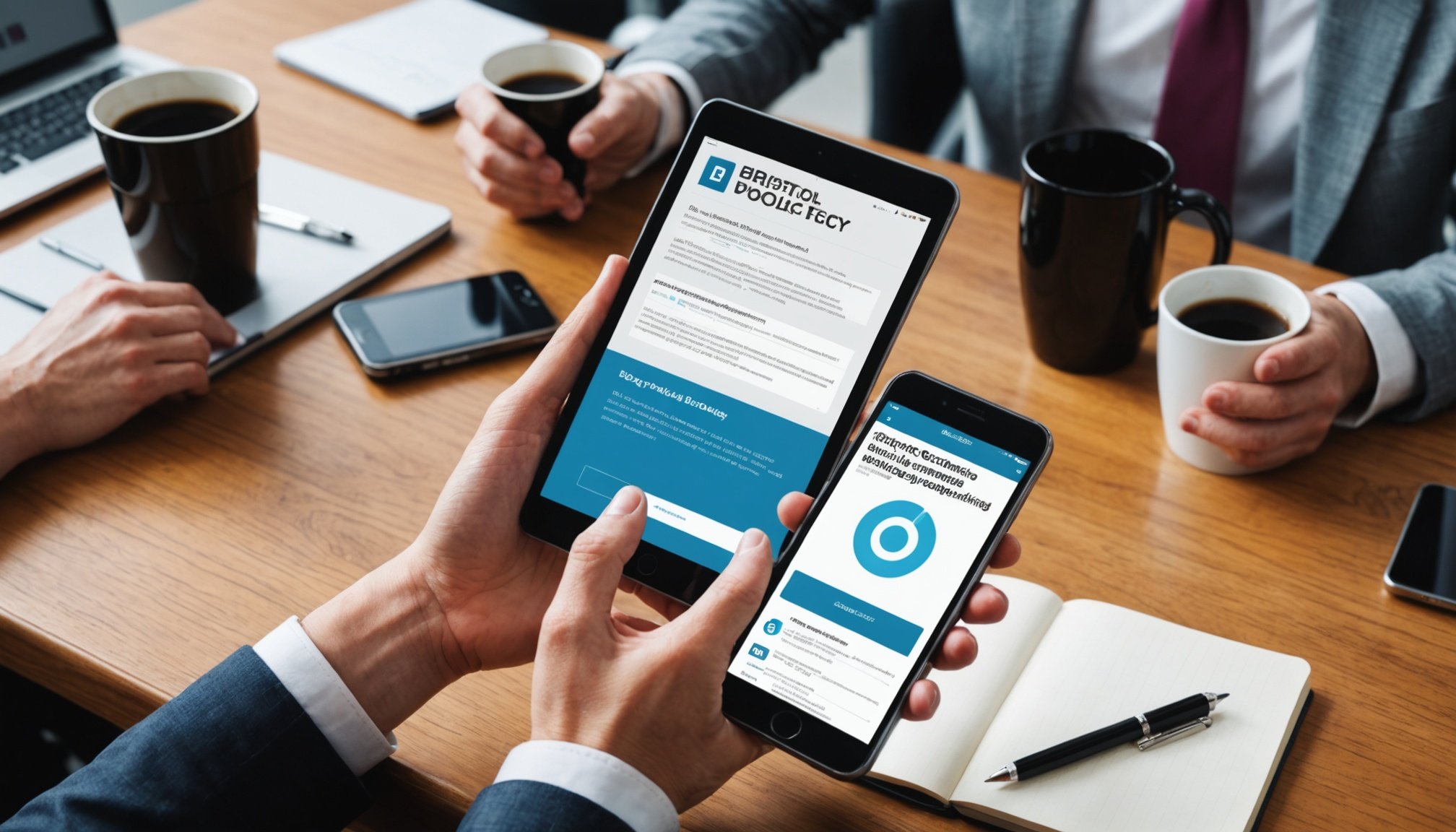Understanding BYOD Policies
In the dynamic environment of marketing agencies, the integration of employee-owned devices marks a significant shift. BYOD Policy, otherwise known as ‘Bring Your Own Device’, enables employees to use personal gadgets for work tasks. This approach fosters flexibility, increases productivity, and reduces equipment costs for companies. Nonetheless, implementing such policies effectively requires careful strategy, particularly regarding compliance and security.
A robust BYOD Policy comprises essential components like clear usage guidelines, security responsibilities, and support procedures. Key areas include defining which applications are permissible, establishing protocols for data access, and detailing disciplinary measures for policy violations. These elements ensure that personal and sensitive business information remains protected while employees enjoy convenience and autonomy.
Have you seen this : Transforming London Consulting Firms: Innovative Strategies for Smooth Cloud CRM Integration
For marketing firms, especially those in places like Bristol, adhering to compliance with legal regulations is critical. Compliance ensures that agencies protect customer data and maintain data integrity, particularly given the sensitive nature of marketing activities. Regulatory frameworks, such as GDPR, dictate strict measures for data protection, and non-compliance could lead to severe repercussions. Therefore, it is crucial that marketing agencies maintain comprehensive and up-to-date BYOD policies that align with these legal standards and address any unique compliance challenges in the regional context. This careful attention to policy design helps maintain operational efficacy and legal safeguarding simultaneously.
Legal Considerations
Navigating the complex landscape of legal regulations is crucial for marketing agencies in Bristol when implementing BYOD policies. Among the most significant laws impacting these policies is the General Data Protection Regulation (GDPR). The GDPR imposes stringent rules on data privacy and security, affecting how personal devices are used for work. Ensuring compliance is not merely about avoiding penalties; it’s about building trust with clients and protecting sensitive data.
In parallel : Transforming Your Birmingham Logistics Business: Fresh Strategies for a Customer-Centric Approach
Additionally, understanding employee rights within the BYOD framework is essential. Employees have the right to privacy, which means their personal information should be safeguarded, even when using devices for work purposes. A clear delineation between personal and professional data access must be established.
Agencies should also be aware of local laws that may add layers to compliance requirements. Emphasizing transparency in policy communications can foster cooperation and understanding between employers and employees. Implementing privacy considerations that respect employees while adhering to regulations provides a balanced approach.
Navigating legal landscapes requires vigilance and commitment to upholding lawful standards. By closely following legal guidelines, marketing agencies can establish robust BYOD systems that are compliant and respectful of privacy considerations. This approach not only protects the company but also ensures that employees feel secure and respected in their work environment.
Data Security Measures
In the realm of marketing agencies, implementing robust data security measures is crucial to aligning with effective BYOD Policy frameworks. The use of personal devices for work demands vigilant cybersecurity practices to prevent data breaches and unauthorized access. To ensure secure operations, agencies should prioritize the encryption of sensitive information and implement strong authentication protocols.
One effective measure is the use of VPNs (Virtual Private Networks), which protect data transmitted over public networks. Additionally, agencies can adopt Mobile Device Management (MDM) solutions. MDM tools allow monitoring and management of devices, ensuring compliance with data security policies. Regular updates to security software also play a pivotal role in safeguarding information systems.
Risk management strategies are essential for identifying potential vulnerabilities. Conducting regular risk assessments will help agencies identify weaknesses and establish preventive measures. Employee involvement in these assessments fosters a proactive security culture within the organisation.
By integrating these cybersecurity measures, marketing agencies can provide a secure environment for BYOD initiatives, balancing operational flexibility with the protection of sensitive business and customer data. This approach enables these agencies to maintain trust and with stakeholders.
Employee Training and Awareness
Incorporating robust Employee Training and Awareness Programs is vital for marketing agencies implementing a BYOD Policy. Employees often become the first line of defence against data breaches, making their education and awareness paramount. Clear training on policy compliance helps ensure that employees understand their responsibilities and the implications of non-compliance.
Agencies should develop comprehensive awareness programs aimed at educating staff about data security and privacy best practices. These programs can cover key topics such as recognizing phishing attempts, safe application installations, and secure data handling. Employees should also be trained on legal and compliance requirements that come with using personal devices for work-related tasks, particularly in regions like Bristol, where regulations can be stringent.
Effective best practices for maintaining device security include regular software updates, use of complex passwords, and avoidance of unsecured Wi-Fi networks. Furthermore, employees should understand how to distinguish between personal and business data to protect sensitive information effectively.
By prioritising employee training and continuous awareness programs, marketing agencies can foster a knowledgeable workforce capable of safeguarding both personal and company data. This proactive approach significantly reduces the risk of data breaches and bolsters the integrity of the agency’s BYOD Policy.
Addressing Challenges in BYOD Implementation
Incorporating a BYOD Policy within marketing agencies presents distinct challenges. Common hurdles include ensuring security and maintaining compliance with regulations. Personal devices often operate on varied systems, complicating standardisation and introducing potential vulnerabilities.
One effective solution is the implementation of comprehensive Mobile Device Management (MDM) tools. MDM solutions allow agencies to monitor, manage, and secure employees’ devices regardless of the platform. They ensure that only authorised applications and data access points are used, thereby safeguarding sensitive agency information.
Another challenge is crafting a consistent user experience across different devices. Agencies can address this through cloud-based solutions that provide uniform application access, irrespective of the physical device used. This approach ensures employees experience seamless productivity while maintaining security.
Adapting to ever-evolving technology requires flexibility. Marketing agencies must remain vigilant in updating their BYOD policies to accommodate technological advancements and emerging threats. Regular reviews and adjustments to these policies are key to overcoming existing challenges and addressing new ones.
Ultimately, flexibility and foresight in policy adaptation help agencies create a resilient BYOD framework, enhancing productivity and maintaining robust security and compliance in an evolving digital landscape.
Real-life Examples and Case Studies
The evolution of BYOD policies in marketing agencies can be better understood through real-world success stories. Case studies from Bristol illustrate how agencies have effectively implemented BYOD policies, maintaining a balance between flexibility and security.
One notable example involves a Bristol-based marketing agency that leveraged cloud-based solutions. This approach allowed for seamless collaboration while ensuring data security. By adopting a zero-trust security model, the agency minimized unauthorized access risks, setting a benchmark in cybersecurity practices.
Lessons learned emphasize the importance of proactive policy updates. Regular reviews of BYOD policies help in adapting to new technological advancements. Successful agencies prioritize feedback loops with employees to tailor their BYOD framework efficiently. This engagement fosters a culture where employees are more cooperative and vigilant.
Best practices derived include establishing clear communication channels. Transparency in policy updates and security protocols ensures employee buy-in and boosts compliance. Integrating user-friendly security measures, such as Mobile Device Management (MDM), further enhances employee experience without compromising sensitive data protection.
Bristol’s market showcases that a well-crafted BYOD strategy not only strengthens data protection but also promotes a collaborative workplace culture. These agencies exemplify how aligning innovative solutions with robust policies can lead to successful BYOD implementation.
Future Trends in BYOD Policies
Understanding the trajectory of BYOD policies is crucial for marketing agencies aiming to remain competitive. With technology rapidly evolving, firms must be keenly aware of emerging future trends that will inevitably shape BYOD approaches. The integration of Artificial Intelligence (AI) and Machine Learning (ML) are altering how devices interact with business systems, providing enhanced data analysis and predictive capabilities. Marketing agencies increasingly rely on these technologies to streamline operations and provide more personalised client services.
Adaptation is key, as policies will need to be flexible enough to accommodate such innovations while safeguarding against new security threats. Given the industry’s dynamic nature, agencies must anticipate changes in technology and adapt their BYOD policies accordingly to maintain compliance and efficiency.
Additionally, the shift towards remote work environments has accentuated the importance of robust technology ecosystems within BYOD frameworks. Cloud-based solutions are integral, allowing employees seamless access to file and application resources, irrespective of location or device.
Agencies should invest in future trends that promote security and efficiency, while also enhancing user experience. By staying ahead of technological advancements, marketing agencies can ensure their BYOD policies are both forward-thinking and secure, benefitting employees and clients alike.











